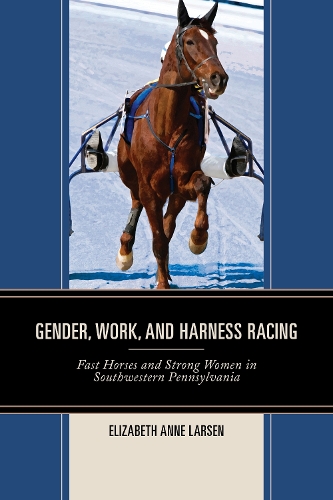
Gender, Work, and Harness Racing: Fast Horses and Strong Women in Southwestern Pennsylvania
(Hardback)
Publishing Details
Gender, Work, and Harness Racing: Fast Horses and Strong Women in Southwestern Pennsylvania
By (Author) Elizabeth Anne Larsen
Bloomsbury Publishing PLC
Lexington Books
19th November 2014
United States
Classifications
Professional and Scholarly
Non Fiction
Labour / income economics
Gender studies, gender groups
Rural communities / rural life
305.4097488
Physical Properties
Hardback
206
Width 162mm, Height 232mm, Spine 19mm
417g
Description
While gender equality has progressed in many sports since the second wave of the feminist movement in terms of womens inclusion, participation, and success, harness horse racing has been recalcitrant to change. Gender, Work, and Harness Racing: Fast Horses and Strong Women in Southwestern Pennsylvania investigates the stories of women involved in harness racing to expose how they use the uniqueness of their situation to work for positive change. With stirring accounts of the strong women who are surviving, and sometimes succeeding, in harness horse racing, Elizabeth Anne Larsens analysis provides insight for studies of gender and work, occupational sex segregation, and womens studies.
Reviews
Elizabeth Anne Larsen takes us inside the fascinatingand often brutalgendered world of harness racing. This engrossing study shows how women carve out a place in a male-dominated business of sports. -- Kathleen M. Blee, University of Pittsburgh; author of Inside Organized Racism: Women in the Hate Movement
Women's gains in professional sports in the post-Title IX era are notably absent in the world of harness racing. Elizabeth Anne Larsen explains how patriarchal relations in the family businesses of owners and trainers sustain and reinforce the marginalization of women in the sport, and shows readers how a growing connection between the sport and the casino/gaming industry is changing the underlying business model, potentially providing an opening for reorganizing gender relations in a way that builds on concepts and strategies from third wave feminism. This book will appeal to anyone interested in gender inequality in sport and in culture industries more broadly. -- William T. Bielby, University of Illinois at Chicago
This very provocative book explores issues that are normally ignored in harness racing. While far more women hold prominent positions in harness racing today, success for women in the sulky has remained out of reach. It is ironic and unfortunate that in the years of harness racings greatest popularity, women were still confined to mostly domestic responsibilities. -- Dean A. Hoffman, University of Arizona
Author Bio
Elizabeth Anne Larsen is professor of sociology at California University of Pennsylvania.
